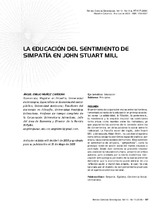La educación del sentimiento de simpatía en John Stuart Mill

View/
Date
2008Author
Muñoz Cardona, Ángel Emilio
xmlui.dri2xhtml.METS-1.0.item-type
article
Citación
Metadata
Show full item recordDocuments PDF
Abstract
El sentimiento de cooperación mutua entre los hombres fomentado a través de la educación en principios sociales como: la solidaridad, la filiación, la pertenencia, la membrecía y la empatía mejoran las condiciones tanto éticas como morales entre los individuos; ya que populariza las acciones de lo correcto sobre las de conveniencia, en otras palabras lo social sobre lo individual. La filosofía moral del inglés, John Stuart Mill, y del escocés, Adam Smith, no conciben el egoísmo como única categoría económica capaz de explicar, por sí sola, las acciones sociales del hombre. Ellos conciben el sentimiento de simpatía, “sympatheia”, como la principal razón de acción social del mundo educado o civilizado. Desde éste contexto se pretende rescatar una visión de la naturaleza humana, presente en ambos autores, pero olvidada por la teoría económica. Concepción antropológica por medio de la cual se pretende demostrar que la economía no puede aislarse de una reflexión social y moral más amplia, la cual ha sido ignorada por el modelo de comportamiento plasmado en el agente económico racional. The sense of mutual cooperation among men fostered through education in social principles such as solidarity, affiliation, membership, membership and empathy conditions improve both ethical and moral among individuals, and to popular actions the right thing on convenience, in other words about what the social individual. The moral philosophy of English, John Stuart Mill, and the Scots, Adam Smith, not conceived as a single category selfishness economic able to explain, by itself, social actions of man. They conceived the feeling of sympathy, "sympatheia" as the main reason for social action of the civilized world or educated. Since this context is intended to recover a vision of human nature, present in both authors, but forgotten by economic theory. Concepcion anthropological through which seeks to demonstrate that the economy can not isolate itself a reflection of broader social and moral, which has been ignored by the pattern reflected in the rational economic agent.
ISSN
1794-8347
Keyword/s
Simpatía
egoísmo
conciencia social
utilitarismo
Sympathy
Selfishness
Social Conscience
utilitarianism
Collections
The following license files are associated with this item:

